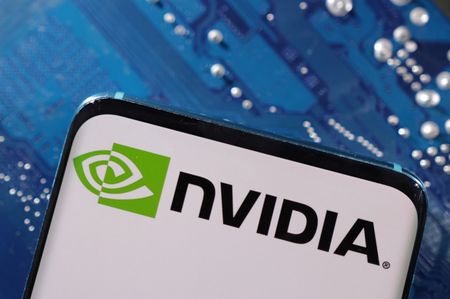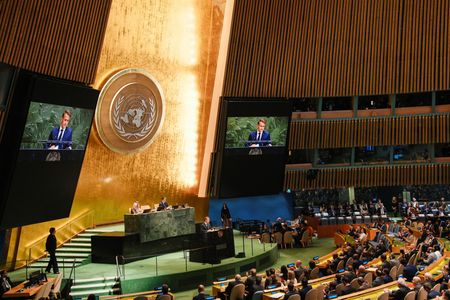By Deepa Seetharaman and Akash Sriram
(Reuters) -Nvidia will invest up to $100 billion in OpenAI and supply it with data center chips, the companies said on Monday, marking a tie-up between two of the highest-profile players in the global artificial intelligence race.
The move underscores the increasingly overlapping interests of the various tech giants developing advanced AI systems. The deal gives chipmaker Nvidia a financial stake in the world’s most prominent AI company, which is already an important customer.
At the same time, the investment gives OpenAI the cash and access it needs to buy advanced chips that are key to maintaining its dominance in an increasingly competitive landscape. Rivals of both companies may be concerned the partnership will undermine competition.
The deal will involve two separate but intertwined transactions, according to a person close to OpenAI. Nvidia will start investing in OpenAI for non-voting shares once the deal is finalized, then OpenAI can use the cash to buy Nvidia’s chips, the person said.
“Everything starts with compute,” OpenAI CEO Sam Altman said in a statement. “Compute infrastructure will be the basis for the economy of the future, and we will utilize what we’re building with Nvidia to both create new AI breakthroughs and empower people and businesses with them at scale.”
The two companies signed a letter of intent to deploy at least 10 gigawatts of Nvidia systems for OpenAI and said they aim to finalize partnership details in the coming weeks. The power for those chips is equivalent to the needs of more than 8 million U.S. households.
Nvidia shares rose as much as 4.4% after the announcement to a record intraday high, while data center builder Oracle gained about 6%. Oracle is working with OpenAI, SoftBank and Microsoft on a $500 billion project called Stargate, a plan to build massive AI data centers around the world.
Under the new deal, once the two sides reach a definitive agreement for OpenAI to purchase Nvidia systems, Nvidia will invest an initial $10 billion, the person familiar with the matter said. OpenAI was most recently valued at $500 billion.
Nvidia will start delivering hardware as soon as late 2026, with the first gigawatt of computing power to be deployed in the second half of that year on its upcoming platform, named Vera Rubin.
Analysts said the deal was positive for Nvidia but also voiced concerns about whether some of Nvidia’s investment dollars might be coming back to it in the form of chip purchases.
“On the one hand this helps OpenAI deliver on what are some very aspirational goals for compute infrastructure, and helps Nvidia ensure that that stuff gets built. On the other hand the ‘circular’ concerns have been raised in the past, and this will fuel them further,” said Bernstein analyst Stacy Rasgon.
OpenAI, like Google, Amazon and others, has been working on plans to build its own AI chips, aiming for a cheaper alternative to Nvidia. A person familiar with the matter said the deal does not change any of OpenAI’s ongoing compute plans, including that effort or its partnership with Microsoft.
OpenAI was working on a custom chip with designer Broadcom and Taiwan Semiconductor Manufacturing Co, Reuters reported earlier this year. Broadcom shares were down 0.8% after the news.
BROADER INDUSTRY MOVES
The pact is the latest in a series of agreements between major technology players. Microsoft has invested billions in OpenAI since 2019, and Nvidia last week unveiled a collaboration with Intel on AI chips. Nvidia also committed $5 billion to Intel earlier this month and backed OpenAI in a $6.6 billion funding round in October 2024.
The scale of Nvidia’s latest commitment could attract antitrust scrutiny. The Justice Department and Federal Trade Commission reached a deal in mid-2024 that cleared the way for potential probes into the roles of Microsoft, OpenAI and Nvidia in the AI industry. However, the administration of U.S. President Donald Trump has so far taken a lighter approach to competition issues than the previous Biden administration.
OpenAI and its main backer Microsoft also announced earlier this month that they had signed a non-binding agreement to restructure OpenAI into a for-profit entity, signaling further changes in the governance of the fast-growing AI company.
“The deal could change the economic incentives of Nvidia and OpenAI as it could potentially lock in Nvidia’s chip monopoly with OpenAI’s software lead. It could potentially make it more difficult for Nvidia competitors like AMD in chips or OpenAI’s competitors in models to scale,” said Andre Barlow, an antitrust lawyer with Doyle, Barlow & Mazard.
He added that the Trump administration has taken a pro-business approach to regulations, removing hurdles that would slow AI growth.
(Reporting by Arsheeya Bajwa and Akash Sriram in Bengaluru and Deepa Seetharaman and Stephen Nellis in San Francisco; writing by Peter Henderson; Editing by Tasim Zahid, Anil D’Silva and Nia Williams)











